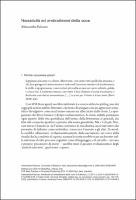Chapter Narratività ed embodiment della voce
| dc.contributor.author | FALZONE, Alessandra | |
| dc.date.accessioned | 2023-05-01T13:42:13Z | |
| dc.date.available | 2023-05-01T13:42:13Z | |
| dc.date.issued | 2022 | |
| dc.identifier | ONIX_20230501_9791221500455_150 | |
| dc.identifier.issn | 2704-565X | |
| dc.identifier.uri | https://library.oapen.org/handle/20.500.12657/62734 | |
| dc.language | Italian | |
| dc.relation.ispartofseries | Moderna/Comparata | |
| dc.subject.classification | thema EDItEUR::D Biography, Literature and Literary studies | en_US |
| dc.subject.other | narrativity | |
| dc.subject.other | embodiment | |
| dc.subject.other | motherese language | |
| dc.subject.other | inner speech | |
| dc.title | Chapter Narratività ed embodiment della voce | |
| dc.type | chapter | |
| oapen.abstract.otherlanguage | When speaking of narrativity, a widely held idea in various disciplinary fields that identity is essentially narrative is often called into question. Numerous linguistic, literary, neuroscientific, and evolutionary studies corroborate this idea. In reality, narrativity in these different fields of study often means different objects of inquiry, which have different definitions and describe different processes and, therefore, different cognitive capacities. In this paper, we will consider the notion of narrativity as a cognitive process, that is, as a component of the human mode of knowledge construction. As such, narrativity would constitute a cognitive universal. From this definition, we will show how narrativity is an eminently linguistic process made possible by the body technology of language and voice in particular. Finally, we will argue for the constitutive and bodily role of language for narrativity in ontogenetic development and inner speech. | |
| oapen.identifier.doi | 10.36253/979-12-215-0045-5.08 | |
| oapen.relation.isPublishedBy | bf65d21a-78e5-4ba2-983a-dbfa90962870 | |
| oapen.relation.isbn | 9791221500455 | |
| oapen.series.number | 41 | |
| oapen.pages | 13 | |
| oapen.place.publication | Florence |

